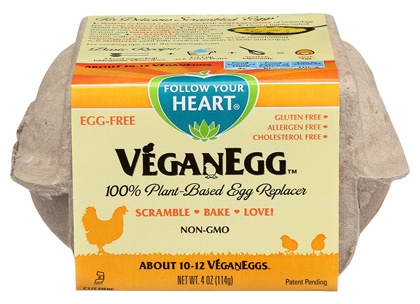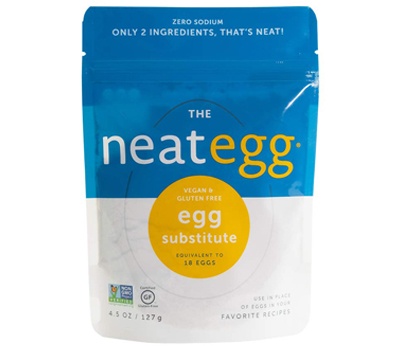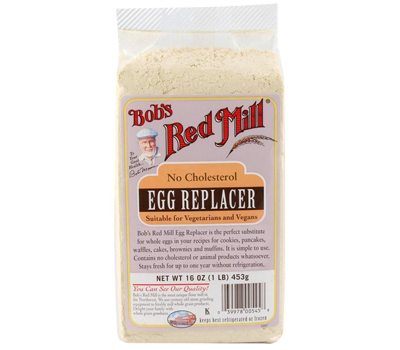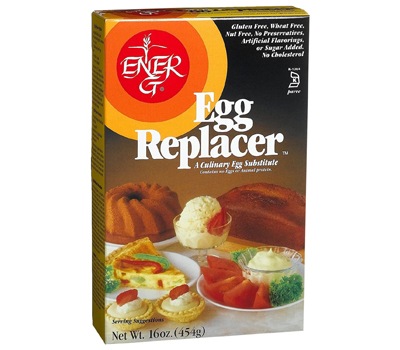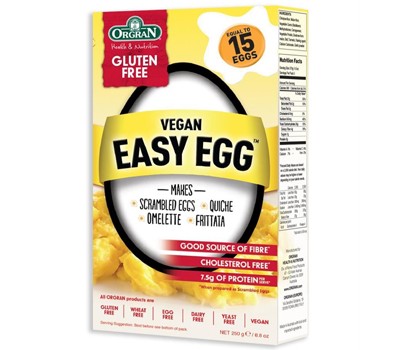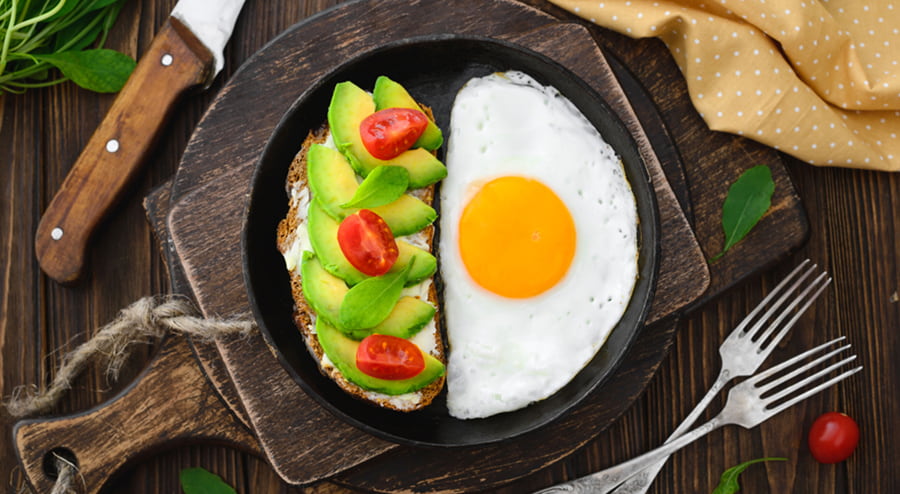
I’ve been asked recently to write about vegan eggs and go into detail about what they actually are.
If you are here, it’s a safe bet that you at least have an interest in adhering to an animal-friendly, plant-based vegan diet. You might be wondering, are eggs vegan? While options for vegans are increasing all the time, it can still be difficult to find vegan alternatives for every type of food.
This can be particularly true for one of the most popular breakfast foods on the planet – eggs. Part of the reason for the popularity of chicken eggs is their versatility. Not only are egg yolks and egg whites common ingredients in many recipes but they are also consumed on their own worldwide in various forms.
So Are Eggs Vegan?
Page Contents:
The problem is eggs are not vegan-friendly. While this may seem obvious, many vegetarians continue to include eggs in their diet to supplement the amount of protein they are getting.
Eggs are the product of a bird’s reproductive system, so they contain reproductive cells and the undeveloped embryos of unborn chicks. For this reason, eggs cannot be considered to be vegan in any way.
Some vegetarians believe that egg and dairy products do not involve the same animal cruelty as meat production but this is a massive misconception. Often, the chickens and cows used for these cruel practices live short and miserable lives filled with suffering.
One of the more unlikely arguments for considering eggs to be vegan is that they are plant-based food. Eggs come from chickens, which are a type of bird, and birds are not mammals. Therefore, eggs cannot be classified as animal products. Another argument is that eggs are a renewable resource. Chickens lay eggs constantly, so there is no need to kill any animals in order to get more eggs.
However, there are some arguments against calling eggs vegan. One is that egg production is not a cruelty-free process. Chickens raised for eggs are typically kept in small cages and are not given enough room to move around. They are also often deprived of food and water. In addition, the male chicks are killed because they cannot lay eggs.
Chickens are living, breathing creatures that feel pain and suffering. Therefore, eating eggs could be seen as contributing to animal cruelty.
The reality is that if you want your diet to be completely cruelty-free, eating eggs is not an option.
Fortunately for vegans, there are plenty of egg alternatives on the market. You can enjoy scrambled eggs, omelets, quiches, and much more, all without harming chickens. If you are relatively new to veganism, these alternatives will help you smoothly transition to a plant-based diet.
Even if you have adhered to a vegan diet for a long time and do not necessarily miss eating eggs, you can still incorporate this versatile vegan-friendly product into your diet and add more variety to your meals.
Vegan Eggs – What Are They?
Plant-based proteins are seeing a major surge in popularity. Even outside of the vegan community, people are searching for cruelty-free protein alternatives. So it should come as no surprise that plant-based egg alternatives are coming to grocery stores everywhere.
Just like other plant-based protein alternatives, such as meatless burgers and vegan cheeses, vegan eggs were created to replicate the texture and taste of a popular animal-derived food without cruelty.
Vegans have been using egg substitutes in their cooking and baking for years. Often this involves replacing eggs with mashed bananas, ground flaxseed paste, applesauce, blended tofu, soy protein powder, and much more. While these can work great as a simple alternative to eggs in a recipe, they do not replicate the taste and texture of an egg when consumed on their own.
What Are Vegan Egg Alternatives Made From?
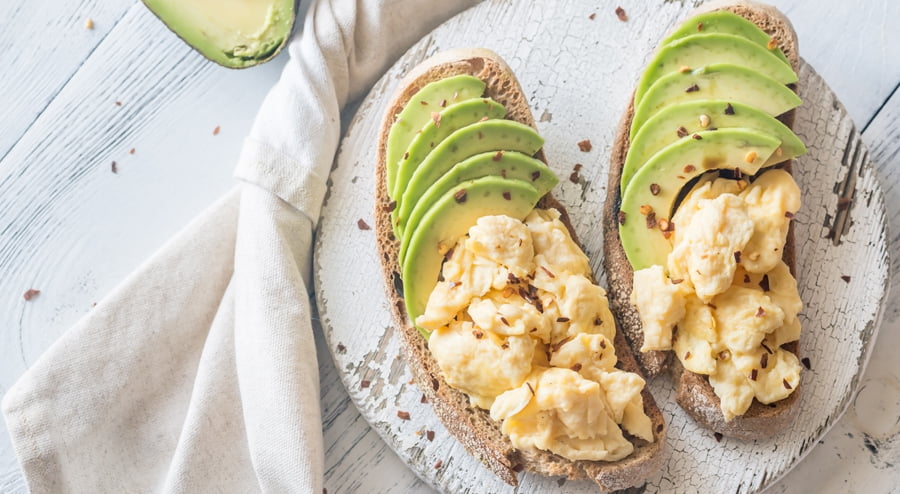
As mentioned, true vegan eggs are made to reproduce the taste and structure of a natural egg rather than just provide a quick replacement ingredient for recipes. For example, popular brand VeganEgg uses large amounts of algae protein, or algal flour, so that their eggs replicate the texture of scrambled eggs. Vegan egg makers use all kinds of tricks to recreate the complex properties of eggs.
Other vegan egg makers use a cocktail of plant-based ingredients to create a product that replicates the look, texture, and taste of a natural egg. For example, Beyond Eggs uses eleven plants to create their egg substitute. These ingredients include sorghum, peas, and beans.
These vegan egg alternatives often come in a liquid or powdered form. Many vegan eggs come in a form that looks just like a whipped natural egg, which makes them perfect for recreating scrambled eggs. Other companies offer vegan alternatives to popular egg-based products, such as vegan-friendly mayonnaise.
What Ingredients Are Used In Vegan Eggs?
While each vegan egg brand uses its own recipe, there are some common ingredients. As mentioned, algae can be used in vegan eggs to give them the same texture as chicken eggs.
While it may sound strange to use an algae byproduct in a vegan egg, algal flour has some major advantages. Not only is algal flour a nutritious and sustainable product, but it also makes it so you can scramble the eggs.
Whole algal flour is a mixture of fiber, ash, protein, fat, and sucrose derived from a type of microalgae. Algal protein is high in essential amino acids, like leucine, valine, and lysine. Not only that, but it is also highly digestible.
Considering some vegans struggle to fill their diet with enough protein, having an algae-based egg alternative that is high in bioavailable protein can be a game-changer. Just like natural eggs, algal flour-based vegan eggs contain high amounts of protein that your body can actually digest and use.
Numerous other plant-based ingredients are used to create vegan eggs. Some brands use turmeric to give their vegan eggs the distinct dark yellow color associated with chicken egg yolks. Considering turmeric is high in curcumin, a compound with numerous proven health benefits, it is great to know it is an ingredient in a vegan egg alternative.
As mentioned, each brand uses its own unique blend of ingredients to create their version of vegan eggs. Mung bean proteins and soybean proteins are among the most popular ingredients. The best thing to do is to check the listed ingredients on each package if you really want an in-depth understanding of what a particular vegan egg is made from.
Keep in mind that, as long as a vegan egg product is listed as certified vegan, it does not contain any animal products and you can rest assured that you are getting a cruelty free alternative to eggs.
Are Vegan Eggs Healthy?
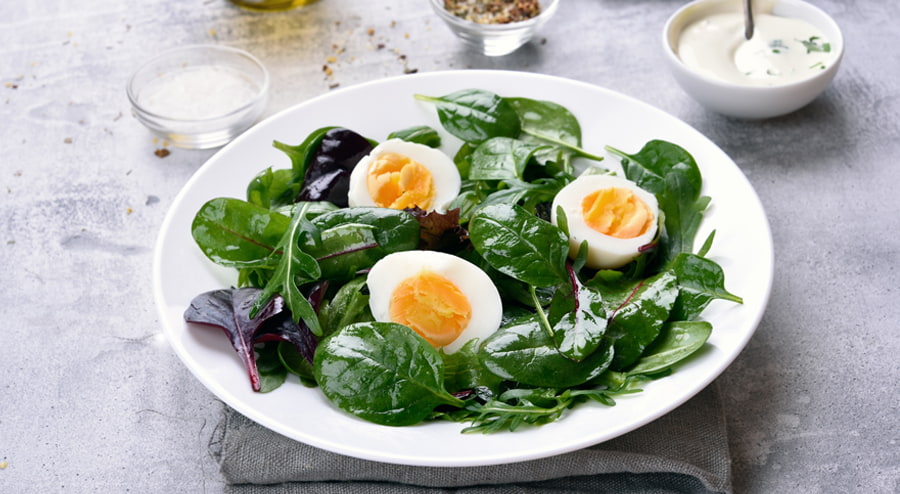
Some brands of vegan eggs have really unique health benefits. Algae powders are a really solid source of vitamin B12 which can be very beneficial for vegans and vegetarians. Other brands use turmeric and similar nutritious ingredients to color and flavor their vegan eggs.
Regardless of brand, one common theme with vegan eggs is that they replicate the protein content of chicken eggs. A chicken egg usually contains about 70 calories, five grams of fat, and six grams of protein. Most vegan egg brands know that vegans struggle to get enough protein so they aim for similar amounts of calories and protein per serving.
Another benefit of vegan eggs is they tend to be free of cholesterol. The impact of dietary cholesterol on regular consumers of eggs has been contested for decades. Some health professionals warn that the amount of cholesterol in eggs can be dangerous while others argue that it is actually healthy in moderation.
With vegan eggs, you do not have to worry about this and can rest assured that your eggs are free of the potential risks associated with high cholesterol egg yolks.
Below is a chart that compares the nutritional content and calories in a typical chicken egg and an equivalent serving of VeganEgg. While brands do differ, the chart gives you an idea of how vegan eggs stack up to the real thing.
|
Typical Chicken Egg |
VeganEgg | |
| Calories |
70 |
40 |
| Calories Derived From Fat |
45 |
15 |
| Total Fat |
5 g |
1.5 g |
| Cholesterol |
185 mg |
0 mg |
| Fiber |
Not a significant source |
5g |
| Protein |
6 g |
5 g |
| Calcium |
2% |
10% |
While chicken eggs do have nutritional benefits, there are some real advantages to consuming vegan eggs. For starters, vegan eggs are plant-based which means they contain important plant fibers.
You also get plenty of calcium and do not have to worry about dietary cholesterol. Overall, you can see why adding a serving of vegan eggs to breakfast can provide you with a very useful nutritional boost.
Do Vegan Eggs Taste Good and How Do You Prepare Them?
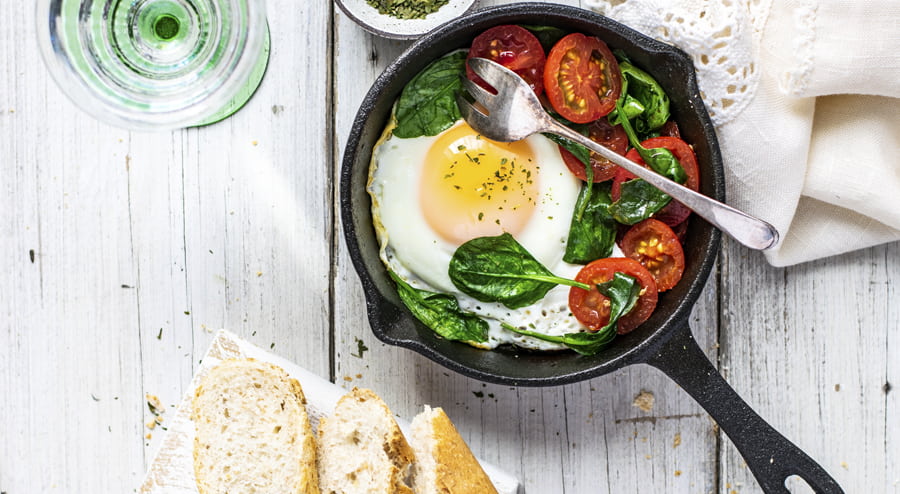
Now that you have an idea of what vegan eggs are made of and how nutritious they can be, you are probably asking yourself, “How do vegan eggs taste, anyway?”
It would not be good if vegan eggs packed a nice nutritional punch but tasted nothing like the real thing. Luckily, that is far from the case. The reality is that most vegan egg brands taste great!
Cooking and Preparation
Vegan eggs come in a variety of forms but for this example, we’re going to look at the brand VeganEgg. VeganEgg is a 100 percent plant-based egg replacement that comes in a four-ounce carton. Each carton can be used to make the equivalent of 10 to 12 vegan eggs.
The carton contains a powdered vegan egg product. As mentioned, VeganEgg uses whole algal powder so their eggs behave much like a chicken egg when cooked. You can choose to scramble VeganEgg or cook it like an omelet. Or, you can use it as an egg replacement in recipes that call for a whisked egg.
Vegan Scrambled Eggs And Omelets
VeganEgg can be scrambled or baked. Not only are they completely vegan-friendly, but they are also gluten, allergen, and cholesterol-free. VeganEgg is one of the most readily available brands of vegan eggs. Part of this is because they are stocked at mainstream grocery store chains, such as Whole Foods or Walmart, rather than just independent health food stores.
With VeganEgg, the basic recipe calls for you to combine two tablespoons of VeganEgg powder with a half cup of ice-cold water. Then, use a whisk to mix the powder and water. After they have been vigorously whisked, the result is a fairly thick batter similar in consistency to pancake batter.
One of the most striking things about this process is that the batter actually has a bit of an egg aroma, almost like there is a touch of sulfur in the air which is due to the black salt used in the recipe. The batter also looks very similar to a whisked chicken egg.
Now that you have prepared your vegan egg mixture, the next step is to begin cooking. Pour the vegan eggs into a lightly oiled skillet. Remember to use vegan-friendly oil when you are preparing any vegan eggs.
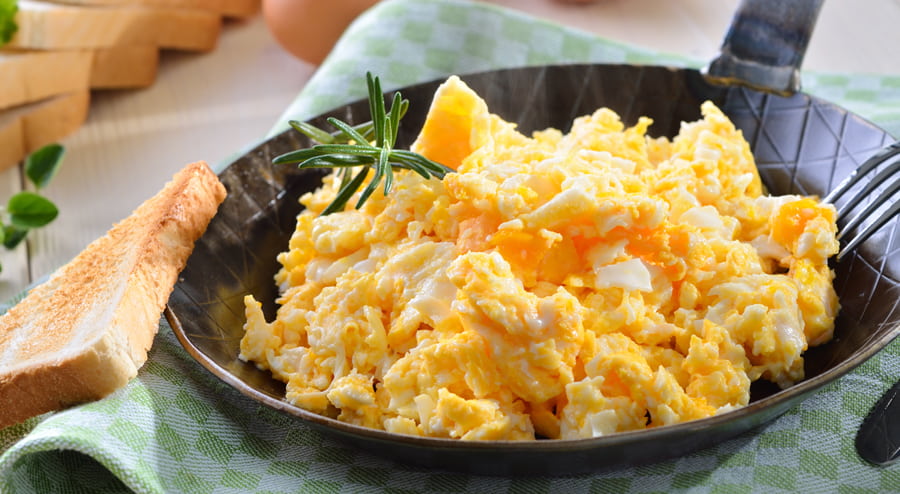
Just like with real eggs, if you want to make vegan-friendly scrambled eggs, you should stir your egg mixture as soon as it hits the hot skillet. Use a spatula to evenly scramble your vegan eggs until the mixture is fully cooked and has a firm texture.
If you want to make an omelet, add your other ingredients and let the bottom crust over – you might want to add more oil to the skillet so you can more easily flip your vegan omelet.
After your egg mixture has completely cooked, you will notice it looks very similar to an omelet or scrambled eggs prepared with natural eggs. This is where the fun starts! Season your eggs with your favorite spices or if you want a more simple experience, just add salt and pepper.
Remember, vegan eggs are meant to replicate chicken eggs as closely as possible. Add the same ingredients you would with any other egg recipe. You really cannot go wrong topping your vegan eggs with a delicious, grated vegan cheese!
Whether you are preparing vegan-friendly scrambled eggs or a vegan omelet, you can also add plenty of diced vegetables. Consider adding mushrooms, bell peppers, chives, onions, and jalapeños. Vegan-friendly sausages and bacon also spice up any vegan egg dish.
How Do They Taste?
VeganEgg tastes great! They look and taste just like the real thing. The color is very similar to that of a scrambled chicken egg and the consistency is almost identical. They actually have a taste that is somewhat reminiscent of cornbread.
As mentioned, one of the great things about cooking any vegan eggs is the versatility. There is a reason people serve eggs at breakfast. You can come up with almost any combination of breakfast foods and add a side of eggs for extra protein.
Consider pairing vegan scrambled eggs with a side of fresh fruit or serve up vegan scrambled eggs and sliced avocado on a toasted piece of vegan-friendly bread.
Even if you have never had chicken eggs in your life and aren’t trying to recreate an old favorite from your pre-vegan days, you can use vegan eggs for their protein benefits. A side of vegan eggs with your breakfast gets your day started with a nice punch of protein. Not only is protein critical for building muscles but it also helps you feel fuller longer and fuels your day.
Storing Vegan Eggs

Another big difference between chicken eggs and vegan eggs is how you store them. When you buy chicken eggs, you need a refrigerator. Without refrigeration, chicken eggs spoil and lose their freshness.
There are also serious health concerns to take into consideration. If a chicken egg is spoiled or has not been fully cooked, there’s a risk of becoming sick. Salmonella poisoning is a serious concern if a chicken egg is spoiled or not prepared correctly.
With vegan eggs, you do not have to worry about food poisoning or freshness. You also save valuable space in your refrigerator by storing unopened containers of vegan eggs in your cupboard.
It is always nice to buy a product with a longer shelf life because you can take advantage of sales and bulk purchasing discounts. Most vegan eggs last about a year before they lose their freshness. With chicken eggs, you can measure their best before date in weeks.
Where Can I Buy Vegan Eggs?
While many companies offer vegan eggs, it is still a relatively new type of food. Not every grocery store will stock a vegan-friendly egg option but they are becoming more popular.
You usually have more luck with grocery chains that stock other vegan products. Whole Foods is great in this regard and you can usually find at least one vegan egg product on their shelves. Another place to look is Amazon. One of the advantages of vegan eggs is they are pretty easy to order online since they do not require refrigeration.
The best advice is just to check with your local health food store or look in the vegan aisle of any major grocery chain nearby.
What Are Some of the Main Vegan Egg Brands?
There are plenty of companies on the market today that offer vegan-friendly egg alternatives. While some are more widely available than others, they all have benefits. With chicken eggs, you do not get a lot of variety.
Sure, there are different levels of quality, but an egg is an egg. With vegan eggs, each brand has its own unique recipe and because of that, each type reacts differently when cooked. They also have a unique nutritional profile that allows you to find the right nutrients for your needs.
Below is a useful comparison of some of the main vegan egg brands on the market today. Remember, there are plenty of other vegan eggs out there and it is worth taking a look to see what is available at your local grocery store or health food store.
VeganEgg
As we discussed, VeganEgg offers a powdered egg compound that’s combined with water and cooked to create a variety of egg-based dishes. While VeganEgg is a really great brand, they do tend to be more on the expensive side. If price is not an issue, you really cannot go wrong with this delicious vegan-friendly egg substitute.
Main Ingredients: Whole algal flour, whole algal protein, plant-based cellulose, carrageenan, nutritional yeast, turmeric, and black salt.
Preparation and Best Use: As mentioned above, VeganEgg scrambles really well and works well as the foundation for a vegan-friendly omelet. Overall, it is a really useful egg replacement for a variety of purposes. You could even use it to create French toast!
The Neat Egg
The Neat Egg uses a combination of chia seeds and garbanzo beans (chickpeas) to create a vegan-friendly egg replacement that is both delicious and nutritious. If you know anything about chia seeds and garbanzo beans, you know how healthy they are.
Each contains plenty of fiber and protein which is great for vegans and non-vegans alike. Neat Egg tastes great but tends to work a little better as an egg replacement in recipes rather than as a standalone replacement for eggs. Consider using them in pancake recipes and to make French toast rather than scrambling them on their own.
The Neat brand also carries some delicious vegan-friendly meat alternatives, such as their vegan ground beef. Keep a look out for this brand even if you do not want to try their vegan eggs.
Main Ingredients: Chia seeds and garbanzo beans.
Preparation and Best Use: Use as an egg replacement in any baking recipe that calls for whisked eggs. It can be a bit gritty when cooked on its own but works great for French toast.
Bob’s Red Mill Egg Replacer
As with most of Bob’s Red Mill products, this vegan egg replacement contains absolutely zero traces of gluten. Most vegans and vegetarians are already familiar with what this brand has to offer. They have built a solid reputation for providing high-quality vegan-friendly and gluten-free products.
As for their vegan egg replacement, it works really well in recipes but not so great on its own. The main selling point for Bob’s Red Mill is its products are on the more affordable side. When it comes to their egg replacement, it is not only affordable but also has a really long shelf life. If you want an inexpensive egg replacement for baking, look no further.
Main Ingredients: Potato starch, baking soda, tapioca flour, and psyllium husk fiber.
Preparation and Best Use: Pretty much only good for baking use. Do not try to use it as an egg replacement on its own.
Ener-G Foods Egg Replacer
If you plan on using vegan eggs on a daily basis, Ener-G Foods might have the perfect product for you. For starters, their 16-ounce box creates an impressive 100 vegan eggs. Unfortunately, these eggs do not do well on their own but they are great for use in recipes.
For vegans that enjoy baking, this vegan-friendly egg replacement might be the perfect bulk solution.
Main Ingredients: Potato starch, tapioca flour, leavening, and modified cellulose.
Preparation and Best Use: Almost exclusively useful for vegan-friendly baking purposes.
Orgran Vegan Easy Eggs
Unlike some of the above-mentioned vegan egg alternatives, Orgran’s vegan eggs are made to be consumed on their own. You can use this product to create a vegan-friendly version of scrambled eggs, quiche, frittata, and omelets.
You get a texture and taste that is pretty close to the real thing without worrying about the odd aftertaste associated with some vegan egg brands. This is a great vegan egg alternative and tends to be a little cheaper than VeganEgg.
Main Ingredients: Chickpea flour, maize flour, vegetable gum, vegetable protein, dextrose, salt, turmeric, calcium carbonate, and garlic powder.
Preparation and Best Use: Orgran behaves similarly to a real egg. You can cook it in the same way you would cook scrambled eggs. You also have the option to cook them in the oven or use them as an egg replacement in recipes.
Are There Vegan Egg Recipes That You Can Make At Home?
While pre-packaged vegan eggs are really convenient to have in your kitchen, there are advantages to making your own vegan egg alternatives. Not only do you have full control over what goes into your food, but you also get a real sense of satisfaction making something from scratch.
Below are some simple recipes for making your own vegan eggs:
5 Minute Vegan Scrambled Eggs
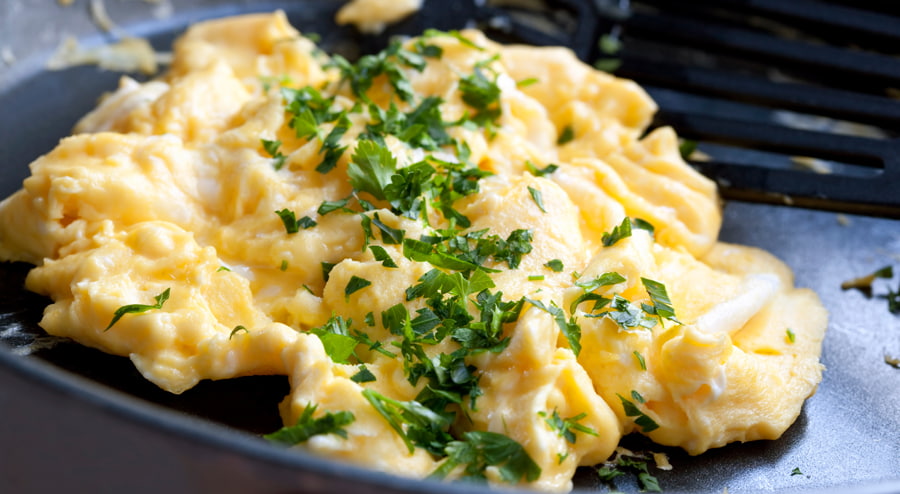
Ingredients:
- White Onion
- Garlic
- Extra Firm Tofu
- Nutritional Yeast
- Lemon
- Black Salt
STEP ONE – SAUTÉ THE ONIONS AND GARLIC
Heat a small amount of coconut oil or olive oil in a sauté pan over medium heat. Most people use olive oil but olive oil is not technically a high-heat oil. Coconut oil may be better for your health.
Add the onions and garlic and sauté for two to three minutes until the onions are translucent and fragrant.
STEP TWO – PREPARE THE TOFU
While the onions are cooking, prepare the tofu by draining it and crumbling it between your fingers. Once you get the right scrambled egg-like consistency, add the spices, nutritional yeast, and lemon juice.
Mix everything together until the flavors are well blended.
STEP THREE – COOK THE TOFU
Add the crumbled tofu to the onion and garlic mixture and sauté for an additional two to three minutes until the tofu has cooked all the way through and any excess water has cooked out.
Homemade Vegan French Toast
Ingredients:
- 6 slices of bread, cut about ¾ inch thick
- 1 cup of vegan-friendly almond milk
- 1 tablespoon of maple syrup
- 2 tablespoons of millet flour
- 1 tablespoon of nutritional yeast
- 1 teaspoon of cinnamon
- ¼ teaspoon of fresh ground nutmeg
- A pinch of table salt
- Coconut oil to cover the frying pan
STEP ONE – MIX INGREDIENTS
In a small bowl, whisk together the maple syrup, cinnamon, flour, nutritional yeast,, nutmeg, almond milk, and salt.
STEP TWO-POUR MIXTURE
Use a shallow baking dish with sides, add the bread, and then pour the mixture over it. Then, lift or flip the bread over to make sure both sides are evenly coated.
STEP THREE – PREPARE THE PAN
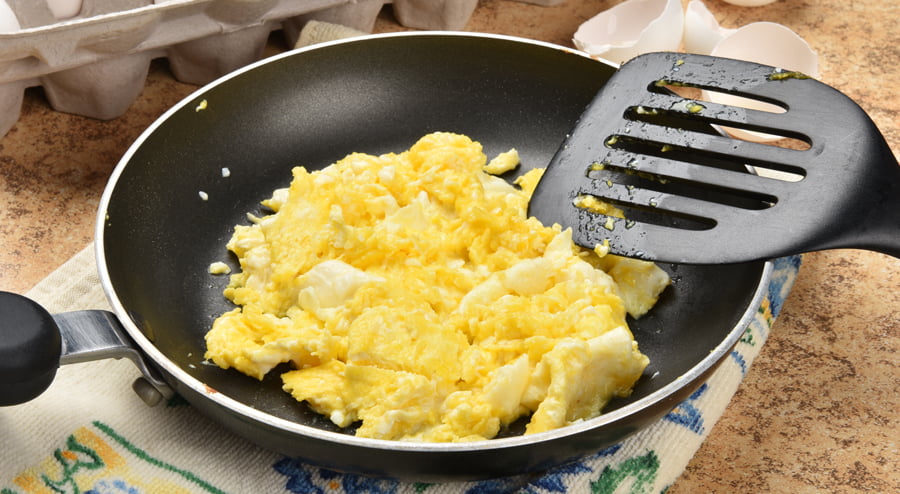
Heat a drizzle of coconut oil in a large skillet over medium heat. When the pan is fully heated, add the coated bread slices and cook for a few minutes on each side or until golden brown.
STEP FOUR – SERVE AND TOP
Serve the cooked French toast. Top with vegan butter, powdered sugar, maple syrup, and fresh fruit, such as berries.
Other Vegan Egg Recipes
There are plenty of recipes out there to make your own vegan eggs. If you are feeling ambitious, you can even find a great number of recipes that teach you how to cook a vegan alternative to a fried egg. While these recipes are more complex, if you are new to veganism and miss fried eggs in the morning, it is worth the effort to give one of these recipes a shot.
So, Is It Worth Incorporating Vegan Eggs Into Your Diet?
In short, it is absolutely worth incorporating vegan eggs into a vegan diet. Not only are they delicious but they are also very healthy. We always hear how breakfast is the most important meal of the day so why not make sure your breakfast contains a healthy serving of protein?
Even though some vegetarians continue to use chicken eggs, this compromises a vegan diet in a significant way. The truth is, opting for a vegan-friendly egg alternative is one of the kindest things you can do for chickens.
In the United States alone, an estimated 305 million hens are held against their will and caged for their eggs. The vast majority of these helpless animals are eventually killed. Even worse, the majority of male chicks never get to see adulthood because they are deemed unprofitable to raise.
Just because you have chosen a path that does not add to this suffering does not mean you cannot enjoy many of the same foods as non-vegans. Whether you choose a prepackaged vegan egg product or opt to make your own vegan eggs, by choosing not to eat chicken eggs you are benefiting your own health and not supporting a cruel industry.
Vegan Egg Videos
Below are some useful videos about vegan eggs. There is so much information out there and these resources can really help!

